You are here
- Home
- Financial Institutions and Economic Security: Speakers
Financial Institutions and Economic Security: Speakers
Mariana Mazzucato
.jpg)
The Open University, Conference Organiser
Mariana Mazzucato is a Professor of Economics at The Open University, where she is also Director of the Inter-Faculty research centre Innovation, Knowledge and Development (IKD). She is the coordinator of the 3 year FP7 project on Finance, Innovation and Growth (FINNOV, 2009-2012, 1.5 million Euros) and a core member of the ESRC Innogen centre. She is a Visiting Professor at the Bocconi University in Milan. Her most recent research has related—theoretically and empirically—the dynamics of technological change and industrial instability to the dynamics of stock price volatility.
William Lazonick
.jpg)
William Lazonick is Professor in the Department of Regional Economic and Social Development at University of Massachusetts Lowell and Director of the UMass Lowell Center for Industrial Competitiveness. He is also affiliated with the CNRS Groupe de Recherche en Économie Théorique et Appliquée of Université Montesquieu Bordeaux IV.
Previously, he was Assistant and Associate Professor of Economics at Harvard University (1975-1984), Professor of Economics at Barnard College of Columbia University (1985-1993), and Distinguished Research Professor at INSEAD (1996-2007). He has also been on the faculties of the University of Tokyo (1996-1997), Harvard Business School (1984-1986), University of Toronto (1982-1983), and was a visiting member of the Institute for Advanced Study in Princeton (1989-1990). Numerous governmental agencies and private foundations in Europe, the United States, and Japan have funded his research.
In 1991 Professor Lazonick was the first economist to serve as president of the Business History Conference, the main professional association of business historians in the United States. His work through the early 1990s was the subject of a chapter in the volume, American Economists of the Late Twentieth Century (Elgar, 1996). He was the youngest of 36 economists selected worldwide to write an autobiographical essay in Exemplary Economists (Elgar 2000). He is the author or editor of twelve books and some 100 academic articles. His work has been translated into Chinese (among a number of other foreign languages). He is regularly invited to speak at academic conferences, research institutes, universities, government agencies, and corporate functions throughout the world.
Professor Lazonick holds a Bachelor of Commerce degree from the University of Toronto (1968), a Master of Science degree in economics from the London School of Economics (1969), and a Doctor of Philosophy degree in economics from Harvard University (1975). In 1991 Uppsala University awarded him an honorary doctorate for his work on the theory and history of economic development.
![]() Presentation: The New Economy Business Model and the Crisis of US Capitalism (PDF document)
Presentation: The New Economy Business Model and the Crisis of US Capitalism (PDF document)
Janet Williamson
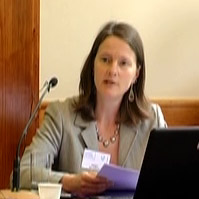
Trades Union Congress. Discussant for the Employment security and the stock market session
Janet is TUC Senior Policy Officer responsible for policy on institutional investment, corporate governance and corporate social responsibility.
She also contributes to TUC pensions policy and campaigning and is a trustee of the TUC.
Beth Almeida
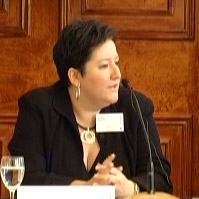
National Institute on Retirement Security, Chair for the Retirement security and pensions session
In November 2007, Beth Almeida was named the first executive director of the National Institute on Retirement Security. With the Board of Directors, Almeida leads the organization's strategic planning, research and education initiatives. During NIRS first full year of operation, she directed the successful launch of the organization's research and education programs that are enhancing the American debate on retirement security challenges.
Before joining NIRS, Ms Almeida served as assistant director for strategic resources and as senior economist with the International Association of Machinists and Aerospace Workers. There, she was instrumental in transitioning some 40,000 airline employees out of terminating or freezing pensions into the IAM's multi-employer defined benefit pension plan.
Ms Almeida also led research initiatives with the Center for European Integration Studies at the University of Bonn, Germany; the European Institute for Business Administration in Fontainebleau, France; and research institutes at the University of Massachusetts.
Ms Almeida has provided expert testimony to legislative, administrative, and judicial bodies. She speaks frequently at conferences from coast-to-coast and internationally regarding economics, pensions, and retirement security issues and is regularly cited in national, local, trade and international news reports. Ms Almeida also serves on the Advisory Board of Center for Retirement Research at Boston College's initiative on state and local government pensions, and on the Executive Board of the Labor & Employment Relations Association.
Ms Almeida earned a bachelor's degree in international business from Lehigh University and a master's degree in economics from the University of Massachusetts Amherst.
Background publications
![]() A Better Bang for the Buck: The Economic Efficiencies of Defined Benefit Pension Plans (PDF Document, 247 KB), by Beth Almeida and William B. Fornia, FSA, August 2008
A Better Bang for the Buck: The Economic Efficiencies of Defined Benefit Pension Plans (PDF Document, 247 KB), by Beth Almeida and William B. Fornia, FSA, August 2008
![]() In it for the Long Haul: The Investment Behavior of Public Pensions (PDF Document, 227 KB), by Christian E. Weller, Ph.D. and Jeffrey Wenger, Ph.D., November 2008
In it for the Long Haul: The Investment Behavior of Public Pensions (PDF Document, 227 KB), by Christian E. Weller, Ph.D. and Jeffrey Wenger, Ph.D., November 2008
Chris Weller
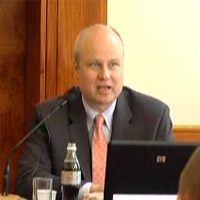
Dr Christian E. Weller is a Senior Fellow at American Progress and an Associate Professor of Public Policy at the University of Massachusetts Boston. His expertise is in the area of retirement income security, macroeconomics, money and banking, and international finance. He is also a research scholar at the Political Economy Research Institute at the University of Massachusetts Amherst. Prior to joining the Center, he was on the research staff at the Economic Policy Institute, where he remains a research associate. Dr Weller has also worked at the Center for European Integration Studies at the University of Bonn in Germany, under the Department of Public Policy of the AFL-CIO in Washington, D.C., and in banking in Germany, Belgium, and Poland.
Dr Weller is a respected academic with more than 100 academic and popular publications. His academic publications have appeared in the Journal of Policy Analysis and Management, the Journal of Development Studies, the Cambridge Journal of Economics, the Journal of International Business Studies, the Journal of Aging and Social Policy, and the Journal of Economic Issues, among others. His popular writings have been published in the New York Times, USA Today, and the Atlanta Journal Constitution. He is the co-author (with E. Wolff) of Retirement Income: The Crucial Role of Social Security (Washington: Economic Policy Institute, 2005) and co-editor (with T. Ghilarducci) of Employee Pensions: Policies, Problems and Possibilities (Ithaca, NY: Cornell University Press, 2007). In 2006, he was awarded the Outstanding Scholar-Practitioner Award from the Labor and Employment Relations Association. In 2007, he was elected to the board of the Labor and Employment Relations Association, one of the country's largest associations for professionals in the fields of labor and employment relations. His work is frequently cited in the press and he is often a guest on national TV and radio programs. Dr Weller holds a Ph.D. in economics from the University of Massachusetts at Amherst.
![]() Presentation: Risk Matters: Retirees Exposed to Growing Risks (PDF document)
Presentation: Risk Matters: Retirees Exposed to Growing Risks (PDF document)
Janneke Toussaint
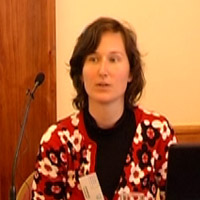
Janneke Toussaint is currently PhD candidate at Delft University of Technology in the OTB Research Institute for Housing, Urban and Mobility Studies. She focuses on the phenomenon of 'housing asset-based welfare'. This subject has been inspired by the growth of home ownership and changes in welfare systems in many European countries. The focus is on household's experiences and attitudes towards this phenomenon in different institutional contexts.
Janneke has a Master in 'Theory and History of Psychology' and in 'Social Psychology' and has been working under supervision of Marja Elsinga in the field of Housing Systems since 2004. She was involved in a European comparative research on the issue 'Securities and insecurities of home ownership' (OSIS); was co-editor of the book 'Homeownership beyond asset and security - Perceptions of housing related security and insecurity in eight European countries'; published some journal articles based on the comparison of countries; and is now again involved in a EU comparative research on 'Demographic change and housing wealth' (DemHow).
![]() Presentation: Households perceptions of building and consuming housing assets in 4 EU countries (PDF document)
Presentation: Households perceptions of building and consuming housing assets in 4 EU countries (PDF document)
The paper Janneke Toussaint is presenting was co-authored by Marja Elsinga.
Marja Elsinga
Marja Elsinga is an associate professor at Delft University of Technology in the OTB Research Institute for Housing, Urban and Mobility Studies. She is an expert in housing governance and institutions. In 1995 she got her PhD for her a thesis on low income home ownership. She has done many research projects, contract research as well as academic work. Her focus is on changing institutions in housing with particular interest in the changing role of home ownership, the changing role of social housing and new ways to achieve affordable housing.
She has participated in the 7th framework project on Securities and insecurities of home ownership (OSIS) and also leads a work package is the ongoing project Housing and Demographic changes (DEMHOW). She is editor in chief of the Dutch journal for housing and associate editor in chief of Elseviers Encyclopedia of Housing and Home.
Howard Gannaway
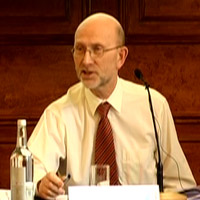
National Institute of Adult Continuing Education. Discussant for the Housing security and mortgages session
As the Research Fellow in Financial Education at the National Institute of Adult Continuing Education (NIACE), Howard Gannaway is responsible for developing NIACE strategy on Financial Learning for adults, for research into the current state of activity in the UK and for the development of programmes for further research and development.
His particular interests include developing a wide-ranging definition of Financial Learning, integrating it into the wider discipline of Economics and encompassing not only aspects of personal finance to do with consumption and savings but also financial knowledge and skills associated with employment, wealth creation and entrepreneurship.
Howard studied for a degree in Archaeology and Anthropology at King's College Cambridge. He then took a Post-Graduate Teaching qualification at Goldsmiths College, London and spent his early years working in the Voluntary Sector, in Secondary Education and ACL. In 1979 he joined the financial services industry, first as a Life Assurance salesperson with Abbey Life and later as an Investment Consultant and Team Manager with Sun Life.
In 1986 he was a Founder Member of the Institute of Financial Planning, which became the professional body for Financial Planners in the United Kingdom and in 1990 he formed his own financial planning practice in partnership with Michael Hague. This practice specialised in often complex planning arrangements for high net worth individuals and families and also for small and medium-sized Director-controlled companies.
Always a supporter of qualifications as an essential component of the emerging discipline of Financial Planning, Howard was one of a small number to take the College of Financial Planning's Certificate of Financial Planning. He went on to become one of the first holders of the international Certified Financial Planner licence in the United Kingdom and was among the first Fellows of the Institute of Financial Planning. Howard was also a frequent speaker at professional seminars and conferences.
From 1991 until 2008 he was a Director of Doncaster Chamber of Commerce, where he was heavily involved in planning the delivery of training and support for new businesses.
He has sat on the FSA's initial Financial Capability Advisory Group and has also been a member of their Working Group on Financial Capability for Families since 2004. He also sat on the Advisory Group of the Basic Skills Agency's Financial Literacy Project before the merger of the BSA with NIACE in 2007.
Since joining NIACE, he has been responsible for developing a strategy for Financial Learning that is integrated with the other areas of NIACE work. He created a national web-based forum for Financial Learning practitioners and has been involved in the development of a number of other learning resources. He manages NIACE's flagship Financial Learning website Money matters to me, which although designed very much with Financial Learning professionals in mind, attracts wide attention from the public as well. His work also involves helping to co-ordinate the new and growing sector of Financial Learning. The Financial Learning team at NIACE now convene and organise the Personal Economics Group and the Financial Learning Qualifications Group.
His interests outside of work include photography, bird watching, cinema, football, running and playing the guitar.
Background publications
![]() Terminology in Financial Learning (PDF document, 36 KB), by Howard Gannaway, January 2009
Terminology in Financial Learning (PDF document, 36 KB), by Howard Gannaway, January 2009
Brian Groom
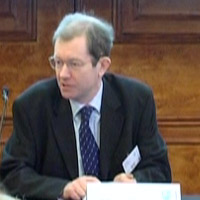
The Financial Times, Moderator for the Financial institutions for economic security roundtable
Brian Groom is UK Business and Employment Editor at the Financial Times, where he has in recent years also been Comment and Analysis Editor, Editor of the Europe Edition, Political Editor and Regional Affairs Editor.
Prior to that he spent 1O years at Scotland on Sunday, as deputy editor and then editor. In an earlier spell at the FT he was UK News Editor and a labour correspondent.
Keith Smith
Prior to his recent appointments at Imperial College in London and the UK Department of Innovation, Universities, and Skills, Keith Smith was Professor of Innovation at the Australian Innovation Research Centre, University of Tasmania. Previous positions include: Director of the Group for Studies in Technology, Innovation and Economic Policy (STEP) in Oslo (1991-2000); Professor of Economics of Technology, Norwegian University of Science and Technology, 1995-2001; and Professor at the Institute for New Technologies, United Nations University, in the Netherlands, 2001-2003. His work has concentrated on the nature and dynamics of innovation processes, on innovation systems theories, on innovation in low-technology industries, innovation and growth in resource-based economies, and the development and analysis of innovation indicators. He also works on the foundations of public policies supporting innovation.
Andrew Tylecote
Andrew Tylecote has been Professor of the Economics and Management of Technological Change at the University of Sheffield since 1994, and has recently been Visiting Professor in the Department of Innovation and Entrepreneurship at Tsinghua University, Beijing, and the National Institute of Innovation Management, Zhejiang University. He was a Major Scholar of Wadham College, Oxford University, where he gained First Class Honours in Philosophy, Politics and Economics in 1968, followed by an MA in Industrial Economics at Sussex, and a BPhil in Economics at Oxford. His research interests span management and economics, with a general focus on technological change, in which most of his recent work has been on the effects of finance and corporate governance (in the widest sense). He led a major EU-funded 6-country project on this topic in 1998-2002 and has since extended this work to East Asia, particularly China. He is currently preparing a revision of his 1992 book on The Long Wave in the World Economy (in which he predicted a depression) tentatively entitled Technology, Finance and Depression: the present crisis in historical perspective.
Yannick Lung
Yannick Lung is professor of economics at Montesquieu University, Bordeaux (France). He is director of the GREThA research unit (UMR CNRS 5113). He participated to several European comparative research programmes in SSH and coordinates presently the ICaTSEM project (Institutional Change and Trajectories of Socio-Economic development models, FP7, CT-SSH-2009-225349).
Matthieu Montalban
Matthieu Montalban is assistant professor in economics at Bordeaux 4 University. He is working on the effect of financialisation on productive models and industrial dynamics, especially in the pharmaceutical and biotech sectors. He is also working on social construction of markets, institutional change and private equity. He has published several books chapters and articles in these topics.
Jürgen Kädtler
Jürgen Kädtler (PD Dr.)was born in 1950. He took his degree in Sociology, History, and German Language and Literature at the University of Göttingen in 1979. He did his doctorate in political and social sciences at Göttingen in 1986, based on a research project on German trade union's dealing with problems of unemployment. He worked at the Berlin University's (FU)Research Institute and at the University of Göttingen as a researcher. Since 1995 he has been senior researcher at the Soziologisches Forschungsinstitut Göttingen [Sociological Research Institute](SOFI). Since 2006 he is director of the institute. His research mainly focuses on industrial relations, on organisation theory and on social framing of economic action. One main subject of his empirical research in recent years has been financialisation and its impact on companies' decision making and industrial relations. Based on this latter research he took his postdoctoral degree (Habilitation) in 2005, based on a thesis on German industrial relelations' perspectives under globalisation and financialised capitalism.
Jürgen Kädtler (PD Dr.) is director of the Sociological Research Institute Göttingen (SOFI). His research mainly focuses on industrial relations, on organisation theory and on social framing of economic action. One main subject of his empirical research in recent years has been financialisation and its impact on companies' decision making and industrial relations.
Richard Minns
Richard Minns is an independent researcher who divides his time and research activitybetween London, UKand Buenos Aires, Argentina. He has worked and livedin Russia, Serbia, and Bulgaria. His latest publicationsinclude The Cold War in Welfare; StockMarkets versus Pensions, Verso 2001, 'Estafa [swindle]; An Alternative Viewon Pension Reform In Latin America', Pensions;an International Journal, December/January, 2007, 'Weapons for Pensions;How Social Security became National Security', The Spokesman, January, 2009. He is currently working on a bookabout debt, pensions and dictatorships in South America (Argentina, Bolivia,Brazil, Chile, Paraguay, Uruguay) and Europe (Greece, Spain, Portugal), and thepoverty of World Bank theory about pension reform, privatisation and economicgrowth.
Pierre Concialdi
Pierre Concialdi, born in 1955, is a graduate of HEC (Hautes études commerciales) and currently working as an economist at France's Institute for Social and Economic Research (IRES). Earlier he worked as a deputy director at the Center for Research on Incomes and Costs (CERC). He is a member of the executive committee of the ENRSP (European Network for Research on Supplementary Pensions). His studies have focused on income distribution, social protection and the financing of social security, tax progressivity and low-wage employment, on which subjects he has published several articles.
Sigurt Vitols
Sigurt Vitols is a Senior Research Fellow at the Wissenschaftszentrum Berlin für Sozialforschung, Visiting Researcher at the European Trade Union Institute, Non-Resident Senior Fellow at the American Institute for Contemporary German Studies, and Lecturer at the Humboldt University Berlin and New York University. His research interests include: corporate governance, financial regulation, pension policies, CSR/SRI/sustainability, and worker participation. He was an undergraduate in the sociology and anthropology department at Haverford College, and did his graduate work in the sociology department at the University of Wisconsin-Madison.
Teresa Ghilarducci
Teresa Ghilarducci is the Irene and Bernard L. Schwartz Professor of Economic Policy Analysis at the New School for Social Research. Her 2008 book When I'm Sixty-four: The Plot Against Pensions and the Plan to Save Them (Princeton University Press) investigates how to restore the promise of retirement for all Americans. Her book Labor's Capital: The Economics and Politics of Employer Pensions, MIT Press, won an Association of American Publishers award in 1992. She co-authored Portable Pension Plans for Casual Labor Markets in 1995. Ghilarducci publishes in referred journals and testifies frequently before the US Congress. She is the WURF fellow at the Labor and Worklife Program at Harvard Law School and serves as a public trustee for the Health Care VEBAs for UAW Retirees of General Motors and for the USW retirees for Goodyear and served on the Pension Benefit Guaranty Corporation's Advisory Board from 1996-2001, and on the Board of Trustees of the State of Indiana Public Employees' Retirement Fund from 1996-2002. Her research has been funded by the Alfred P. Sloan Foundation, US Department of Labor, the Ford Foundation, and the Retirement Research Foundation.
Bryn Davies
Bryn Davies is the Director of Union Pension Services Ltd, a unique consultancy on occupational pension schemes, primarily for trade unions.From 1985 to 1989 he was a Research Actuary, then a Partner, at Bacon & Woodrow, Consulting Actuaries. From 1974 to 1981 he was Pensions Officer at the Trades Union Congress, advising on occupational and State pensions and responsible for the development and implementation of Congress policy. He has been a Fellow of the Institute of Actuaries since 1974. He earned a bachelor's degree in economics from Hull University and a master's degree in Social Policy Research from the London School of Economics.
Alan Shipman
Alan Shipman is an economist, formerly a business journalist and emerging-markets analyst, who has written on globalization, market theory, economic sociology and the social impact of social science. He has also commentated extensively on 'transition economies' since the early 1990s, and joined the Open University in 2008 after freelancing for ten years.
Damon Silvers
Damon A. Silvers is an Associate General Counsel for the AFL-CIO. Mr Silvers' responsibilities include capital markets, corporate governance and general business law issues.
Mr Silvers is the Deputy Chair of the Congressional Oversight Panel for TARP. He was appointed jointly by House Speaker Nancy Pelosi and Senate Majority Leader Harry Reid. He also was the Chair of the Competition Subcommittee of the United States Treasury Department Advisory Committee on the Auditing Profession and a member of the United States Treasury Department Investor's Practice Committee of the President's Working Group on Financial Markets and is the Chair. Mr Silvers is also a member of the Public Company Accounting Oversight Board Standing Advisory Group and the Financial Accounting Standards Board User Advisory Council.
Prior to working for the AFL-CIO, Mr Silvers was a law clerk at the Delaware Court of Chancery for Chancellor William T. Allen and Vice-Chancellor Bernard Balick.
Mr Silvers received his J.D. with honors from Harvard Law School. He received his M.B.A. with high honors from Harvard Business School and is a Baker Scholar. Mr Silvers is a graduate of Harvard College, summa cum laude, and has studied history at Kings College, Cambridge University.
Mr Silvers is the primary author of "AResponse to Vice-Chancellor Leo Strine Jr.'s, Toward Common Sense and Common Ground? Reflections on the Shared Interests of Managers and Labor in a More Rational System of Corporate Governance," published in The Journal of Corporation Law (2007) and "The Current State of Auditing as a Profession: A View from Worker-Owners," published in Accounting Horizons (2007). He is also the author of "Securities and Exchange Commission: Restoring the Capital Markets Regulator and Responding to Crisis," published in Change for America: A Progressive Blueprint for the 44th President (2008).
John Doling
John Doling holds the chair in housing studies in the College of Social Sciences, the University of Birmingham, UK. He has published many books and academic papers about housing markets and housing policy in the advanced economies of Europe and East Asia. In recent years he has led a number of large-scale, Europe-wide, research studies including the OSIS project ( Origins of Security and Insecurity: the interplay of housing systems with jobs, household structures, fiancé and social security). The current project, DEMHOW (Demographic change and housing wealth), is scheduled for completion at the end of 2010.
Nick Horsewood
Nick Horsewood is a Senior Lecturer in the Department of Economics, the University of Birmingham, UK. His research on the housing market has focused on its impact on the wider economy, for example the link between home ownership and early retirement, and he edited, along with Peter Neuteboom, The Social Limits to Growth: Security and Insecurity Aspects of Home Ownership. He is the leader of the quantitative part of the EU-funded project, DEMHOW (Demographic change and housing wealth), which has analysed the role that housing wealth plays in the lives of households in various European countries.
Peter Neuteboom
Peter Neuteboom specializes in research into mortgage systems in the home-ownership sector in the Netherlands, and (especially) from a comparative European perspective.
He spends a large part of his time developing a simulation model that can easily draw comparisons between mortgage costs and risks for owner-occupiers (the ultimate aim is to compare the costs and risks in a European context).
In recent years Peter Neuteboom has also engaged in specific research into the fiscal aspects of home ownership in Europe and the mechanisms of guarantee funds inside and outside Europe.
Finally, he is participating with eight foreign universities in an EU project on the '(In)security aspects of Housing' which aims to map out the risks and opportunities for and the attitudes of owner-occupiers.
Claude Dupuy
Claude Dupuy is Professor of Economics at the University Montesquieu in Bordeaux, where he also co-coordinates the Doctoral Program in Economics and Management and leads the program "Industry and space" in the Gretha. GREThA is a joint research unit between Bordeaux IV University and CNRS. The unit gathers more than 40 permanent active researchers, with an activity of constant research and scientific production. The scientific project of the unit includes five research programs where all competences present within the unit are put forward to ensure a credible articulation with the recent developments of economic science around theoretical and empirical issues. GREThA's researchers are involved in several international networks and take part in European projects within the framework of the 6th framework program of the European Commission (FP6) and soon in the 7th (FP7).
His major research areas include economics of proximity, industrial organisation and industrial dynamics, finance and corporate governance, geography of finance.
Lucy Fallon-Byrne
Lucy was appointed Director of the National Centre for Partnership and Performance on its establishment in 2001. The NCPP is the Government agency charged with promoting partnership-led change and innovation in Ireland's workplaces. Lucy provides strategic direction and oversees the delivery of an extensive work programme, which covers a broad range of workplace-related research and advocacy activities. Key milestones for the NCPP include the Forum on the Workplace of the Future (2003-2005), whose final report was adopted by Government as the National Workplace Strategy. Together with Enterprise Ireland, the NCPP also manages a new Workplace Innovation Fund, which provides financial support for workplace innovation in Irish companies.
Lucy is a member of the Executive Board of Trócaire. Prior to joining the NCPP, she served as Assistant Chief Executive of the National Council for Curriculum and Assessment where she oversaw the development of the new Primary School Curriculum. Lucy holds a MA in Political Science, and an MBA from the Michael Smurfit School of Business at UCD. She began her career as a primary school teacher and principal.
Jonquil Lowe
Jonquil Lowe is an economist who worked for several years in the City as an investment analyst, and is a former head of the Money Group at Which?. She is currently a Lecturer in Personal Finance with The Open University and also works as a freelance financial researcher and journalist. Jonquil holds the Diploma in Financial Planning, is author of over 20 consumer personal finance books and has worked with a wide range of organisations on financial capability initiatives, including the Financial Services Authority Parent's Guide to Money and Age Concern MoneyTrail.
Monthly Event Archive
- March 2024 (2)
- January 2024 (1)
- December 2023 (2)
- November 2023 (1)
- October 2023 (2)
- May 2023 (1)
Contact us
To find out more about our work, or to discuss a potential project, please contact:
International Development Research Office
Faculty of Arts and Social Sciences
The Open University
Walton Hall
Milton Keynes
MK7 6AA
United Kingdom
T: +44 (0)1908 858502
E: international-development-research@open.ac.uk
.jpg)